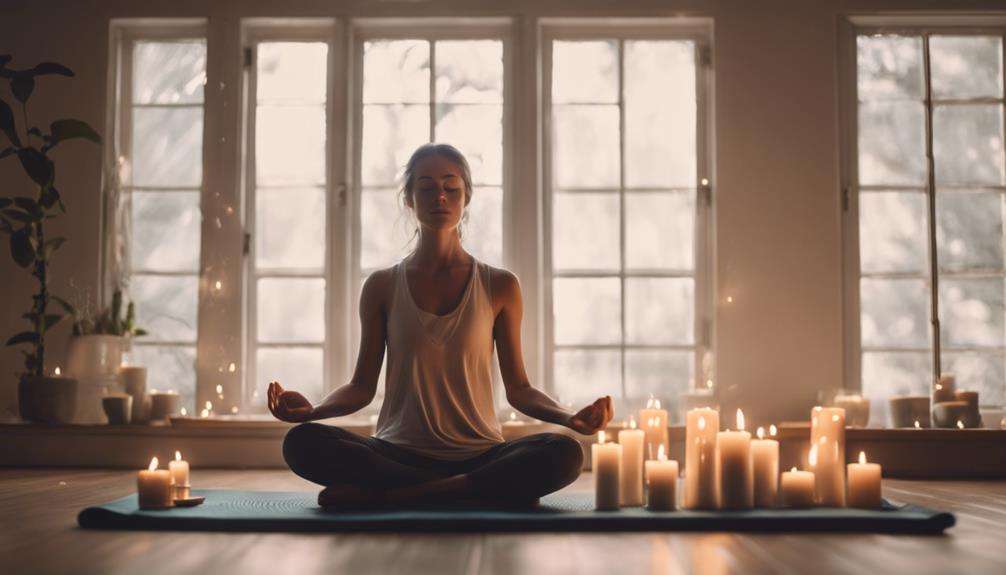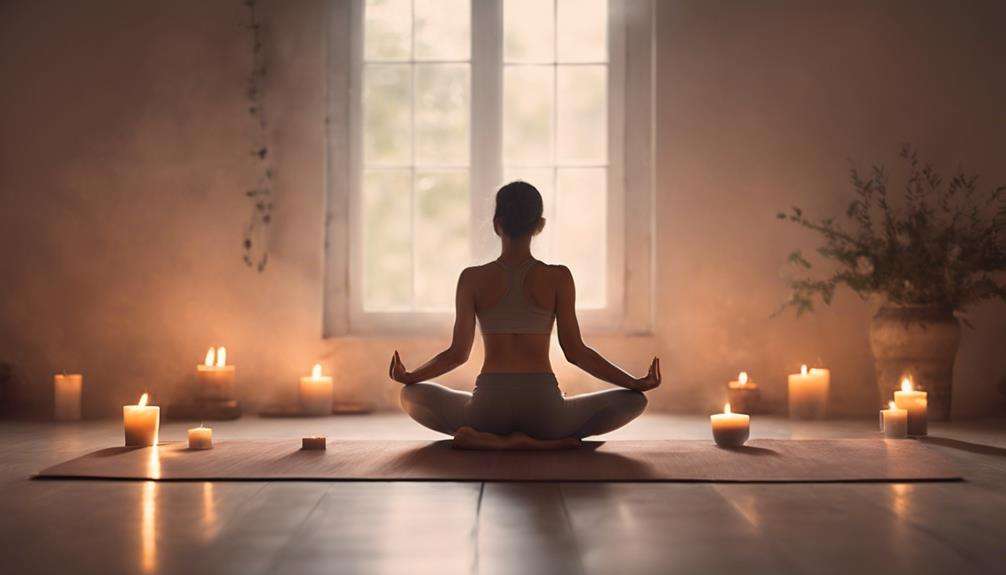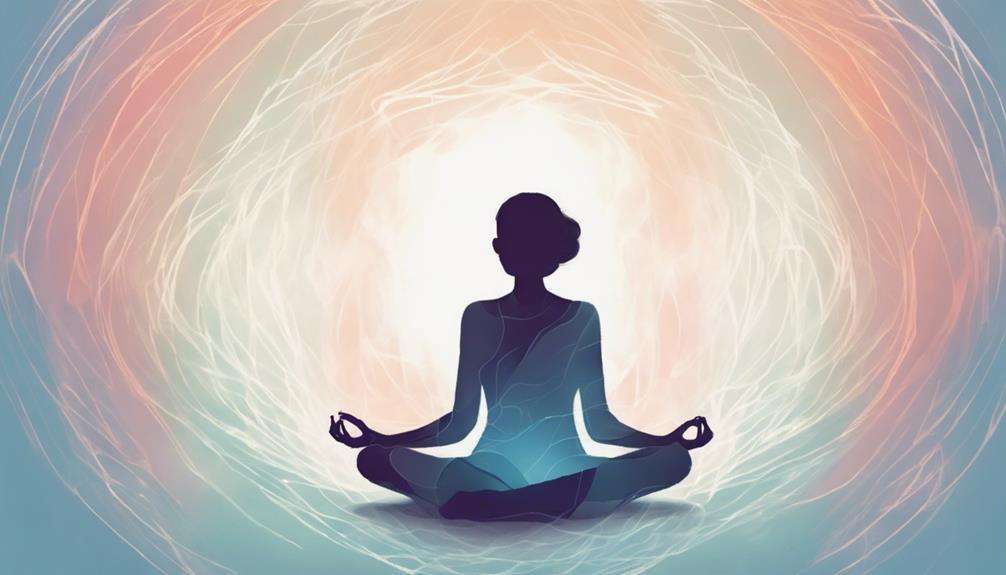Did you know that studies have shown that regular meditation and yoga practices can significantly reduce symptoms of anxiety and depression in individuals?
By incorporating these mindful techniques into your daily routine, you can experience a profound shift in your emotional well-being.
The power of meditation and yoga lies in their ability to cultivate a sense of inner peace and calmness, allowing you to navigate life's challenges with resilience and grace.
Dive into the world of emotional wellness through meditation and yoga, and discover a transformative journey towards a more balanced and harmonious state of mind.
Key Takeaways
- Reduce anxiety and depression with yoga and meditation.
- Enhance emotional clarity and cognitive functions.
- Decrease cortisol levels and increase GABA neurotransmitters.
- Find inner peace and emotional stability through mindfulness practices.
Benefits of Yoga and Meditation
Yoga and meditation offer a plethora of benefits for emotional wellness, ranging from reducing symptoms of anxiety and depression to promoting cognitive functions and enhancing emotional clarity. These practices have been shown to calm the mind, reduce stress levels, and alleviate symptoms of anxiety and depression. Regular engagement in yoga and meditation can lead to a decrease in the production of cortisol, the stress hormone, and an increase in the neurotransmitter GABA, which is associated with improved mood and reduced anxiety.
Research suggests that yoga and meditation not only have a direct impact on emotional well-being but also contribute to improved cognitive functions. By engaging in these practices, individuals can enhance their memory, executive functions, and overall mental clarity. Furthermore, the act of meditation helps shift the nervous system into a relaxed state, fostering emotional stability and a sense of calm.
Stress Reduction Techniques
To effectively manage stress and promote emotional well-being, incorporating stress reduction techniques into your daily routine is crucial for maintaining a healthy balance in your life. Here are some effective stress reduction techniques that can help you navigate challenging moments:
- Deep Breathing Exercises: Engaging in deep breathing exercises can help activate your body's relaxation response. By taking slow, deep breaths, you can lower stress hormones, reduce anxiety, and calm your mind. Practice deep breathing whenever you feel overwhelmed or anxious to bring a sense of calmness to your day.
- Meditation Apps: Utilizing meditation apps can provide you with guided meditation sessions tailored to reduce stress and promote emotional wellness. These apps offer a convenient way to incorporate meditation into your daily routine, helping you build resilience against stressors and enhance your overall well-being.
- Mindfulness Techniques: Practicing mindfulness through activities like mindful breathing or body scans can help you stay present, acknowledge your thoughts without judgment, and reduce stress levels. Mindfulness techniques can be integrated into your day to cultivate a sense of peace and emotional stability.
Mindfulness Practices for Anxiety

If you experience anxiety, incorporating breathing techniques for anxiety and body scan practices into your daily routine can help alleviate symptoms.
These mindfulness practices aim to regulate your body's stress response and bring a sense of calmness to your mind.
Breathing Techniques for Anxiety
Utilizing mindfulness breathing techniques can significantly alleviate anxiety symptoms by calming the nervous system and promoting a sense of relaxation. When feeling anxious, try these techniques to lower stress levels and enhance emotional well-being:
- Deep Breathing: Engage in slow, deep breaths to activate the body's relaxation response and reduce cortisol levels.
- Diaphragmatic Breathing: Focus on breathing deeply into your diaphragm to increase oxygen flow, calm the mind, and alleviate anxiety.
- Mindful Breathing Practices: Incorporate mindfulness into your breathing exercises by observing each breath without judgment, helping to improve emotional regulation and reduce anxiety levels.
Body Scan Practice
Engage in the practice of body scanning to enhance your mindfulness skills and reduce anxiety symptoms effectively.
Body scan practice is a mindfulness technique that involves focusing on different parts of the body sequentially to increase awareness and promote relaxation. By systematically scanning from head to toe, you can recognize physical sensations, emotions, and tension, fostering stress relief.
Research indicates that this practice can decrease anxiety symptoms and enhance emotional well-being. Cultivating mindfulness through body scanning allows for a deeper connection to the present moment, aiding in managing anxiety and improving self-awareness.
Regularly incorporating body scan practice into your routine can be a valuable tool for fostering emotional wellness and reducing anxiety levels.
Relaxation Techniques for Emotional Well-Being
Relaxation techniques such as deep breathing, progressive muscle relaxation, and visualization are effective ways to reduce stress and enhance emotional well-being. These methods can help you cultivate a sense of calm and promote emotional balance.
To further aid in relaxation, consider the following:
- Deep Breathing: Take slow, deep breaths in through your nose, allowing your belly to expand, then exhale slowly through your mouth. Repeat this process for a few minutes to calm your mind and body.
- Progressive Muscle Relaxation: Start by tensing and then relaxing each muscle group in your body, working from your toes to your head. This technique can help release physical tension and promote a sense of relaxation.
- Visualization: Close your eyes and imagine a peaceful scene or a place where you feel safe and relaxed. Focus on the details of this mental image to distract yourself from stress and promote emotional well-being.
Engaging in these relaxation techniques regularly can significantly lower anxiety levels and improve your overall emotional health. For more structured guidance, consider using the Calm app for guided meditations tailored to relaxation and emotional wellness.
Coping Strategies for Reduced Anxiety

To effectively manage reduced anxiety, implementing coping strategies grounded in mindfulness and movement practices can foster a sense of calm and resilience. Mindfulness meditation, by focusing on the present moment, has been proven to reduce symptoms of anxiety. Incorporating yoga practices, such as deep breathing and gentle movements, can help decrease feelings of anxiety and stress.
Research indicates that regular meditation and yoga practice can lower levels of cortisol, the stress hormone, contributing to a decrease in anxiety levels. These mind-body practices have also been linked to improvements in mood and overall emotional well-being.
Combining meditation and yoga techniques provides effective tools for managing anxiety and promoting emotional wellness. By engaging in these practices consistently, you can develop a greater sense of self-awareness and emotional regulation, leading to a calmer and more resilient state of mind amidst life's challenges.
Emotional Wellness Through Yoga
Enhancing emotional well-being through yoga practices like asanas, pranayama, and meditation offers a holistic approach to reducing stress and fostering relaxation. Yoga's impact on emotional wellness is profound, with benefits extending to mental health and overall emotional stability. Here are three key ways yoga contributes to emotional wellness:
- Stress Reduction: By engaging in yoga postures and controlled breathing exercises, individuals can lower cortisol levels, the hormone associated with stress. This reduction in stress hormone levels can lead to a calmer mind and improved emotional resilience.
- Mental Health Support: Research indicates that regular yoga practice can alleviate symptoms of anxiety, depression, and PTSD. The focus on mindfulness and breathwork in yoga helps individuals cultivate self-awareness and inner peace, contributing to enhanced mental well-being.
- Meditation Techniques: Incorporating meditation into yoga sessions can further promote emotional stability. Meditation techniques like mindfulness meditation help individuals develop a focused and calm state of mind, fostering emotional balance and overall well-being.
Meditation for Calming the Mind

When looking to calm your mind through meditation, focusing on breathing techniques can help bring clarity and concentration.
By incorporating mindfulness practices into your daily routine, you can cultivate a sense of inner peace and awareness.
Discovering these methods may aid in reducing stress and promoting emotional well-being.
Breathing Techniques for Focus
Breathing techniques, such as the Four-Stroke Breath, play a vital role in focusing the mind and calming it through a combination of deep inhalations and rhythmic exhalations. This technique involves pressing the hands together in a modified prayer pose while thinking the healing mantra 'sat na ma' during exhalation. By incorporating this practice into your routine, you can experience emotional wellness and self-love as you repeat 'sat nam' chants at the end of the exercise.
The rhythmic breathing pattern of the Four-Stroke Breath aids in calming the mind, reducing stress, and enhancing concentration. Utilizing this method in your meditation or yoga sessions can provide support for emotional stability and mental balance.
- Helps in focusing the mind
- Calms the mind and reduces stress
- Enhances concentration
Mindfulness in Daily Life
Transitioning from focusing on breathing techniques, the practice of mindfulness meditation in daily life serves as a powerful tool for calming the mind and fostering emotional well-being. Mindfulness practice involves being present in the moment without judgment, which can help reduce stress, anxiety, and negative emotions.
Finding Inner Peace
To achieve inner peace through meditation for calming the mind, one must cultivate a consistent practice that nurtures emotional stability and mental clarity. Research shows that meditation can help calm your mind by reducing stress and anxiety, promoting emotional well-being.
Mindfulness meditation techniques improve focus, concentration, and decision-making skills, aiding in managing emotions and cultivating tranquility. Regular meditation practice enhances emotional well-being, leading to inner peace and balance.
Various methods such as guided meditation and breathwork support emotional wellness and inner peace by providing tools to navigate challenging emotions and thoughts. Embrace a regular meditation routine to experience the benefits of a calm and peaceful mind.
Yoga Poses for Anxiety Relief

When seeking relief from anxiety, incorporating specific yoga poses into your routine can significantly contribute to promoting relaxation and reducing stress levels. Yoga poses such as Child's Pose, Legs-Up-The-Wall, and Cat-Cow are particularly beneficial for alleviating anxiety. These poses not only help stretch and relax the body but also calm the mind, creating a sense of tranquility. Regular practice of these poses has been shown to lower cortisol levels, the stress hormone, leading to a reduction in anxiety symptoms.
Deep breathing techniques combined with yoga poses further enhance the relaxation response in the body, helping to alleviate feelings of anxiety. By stimulating the parasympathetic nervous system, yoga poses induce a state of calmness, making them effective tools for managing anxiety. Research studies have highlighted the effectiveness of yoga poses in reducing anxiety levels and improving overall emotional well-being, making them a valuable resource for individuals dealing with anxiety related to stressful work, chronic pain, or seeking guidance from a healthcare professional.
Frequently Asked Questions
How Does Meditation Improve Emotional Wellbeing?
Meditation enhances emotional wellbeing through mindfulness practices that aid in emotional regulation and stress reduction. By calming your mind and increasing self-awareness, meditation helps you manage emotions effectively and cultivate inner peace.
How Does Yoga Benefit Emotional Wellbeing?
Yoga enhances your emotional well-being by strengthening the mind-body connection. It relieves stress and promotes emotional balance by increasing GABA levels. This practice positively impacts your limbic system, reducing emotional reactivity and fostering mental stability.
How Much Does Calm Cost a Month?
If you're considering Calm for emotional wellness support, the cost analysis reveals $14.99 monthly or $69.99 annually. Budgeting tips suggest the yearly option for financial planning. Dive into over 250 Sleep Stories, meditations, and more.
How Does Yoga Create Mental Calmness?
Engage in yoga for mental calmness by practicing breath control, fostering a mind-body connection, and reducing stress. These elements work together to promote relaxation and emotional well-being, enhancing your ability to manage daily challenges.
Conclusion
In conclusion, incorporating meditation and yoga into your daily routine can significantly improve your emotional well-being.
For example, imagine a busy professional who struggles with anxiety. By practicing mindfulness and engaging in calming yoga poses, they're able to reduce stress levels and find inner peace amidst their hectic schedule.
Remember, taking care of your mental health is essential for overall wellness. So, make time for yourself and prioritize your emotional well-being.






